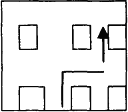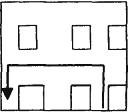题目内容
听力(Listening Comprehension)
A)听下面五段对话每段对话后有一小题,从题中所给的三个选项中选出最佳选项。每段对话仅读遍
1.What will the man do?
A.He will leave for Guangzhou
B.He will leave for Hangzhou
C.He will move to Guangzhou.
2.What does the woman find there?
A.Oil and sand.
B.Nothing.
C.Soil and land.
3.Who will go to see the woman off?
A.Some of her classmates.
B.Her mother and a classmate.
C.Many people.
4.Which sentence of the following is true?
A.There is a road near the forest.
B.The forest is too thick.
C.We won't travel forward until we find a road.
5.When does this dialogue happen?
A.After choosing a hotel.
B.Before a travel.
C.After a travel.
B)听下面5段对话或独白。每段对话或独白后有几道小题,从每题所给的A、B、C三个选项中选出最佳选项。每段对话或独白你将听两遍。
听下面一段材料,回答第6~7题.
6.Which two words did Sara tell the man to pronounce?
A.Trouble and explain.
B.Travel and explain.
C.Travel and clear.
7.Which of the three is true according to the dialogue?
A.Sara told the man the meaning of“clearly”.
B.Sara told the man how to pronounce“clear”.
C.The man didn't know how to spell the word“clear”.
听下面一段对话,回答第8~10题。
8.Where was the woman's money probably stolen?
A.It was probably on the bank.
B.It was probably in the moving stair from the underground.
C.It was probably outside the bank.
9.How much of her money was stolen?
A.£ 4,500.
B.£ 5,400.
C.£ 4,900.
10.What is the woman doing in the city?
A.She is on a business trip there.
B.She is a visitor there.
C.She is a citizen there.
听下面一段对话,回答第11~13题。
11.Where is the man going to travel?
A.Honolulu and Chicago.
B.Chicago.
C.Honolulu.
12.How much will the man probably pay for the tickets?
A.At most $ 952.
B.At least $ 952.
C.About $ 476.
13.Which flight(s)is the man going to take for his round trip?
A.Flight 220 and Flight 476.
B.Flight 476 and Flight 220.
C.Flight 220 and then Flight 141.
听下面一段对话,回答第14~17题。
14.For what was the woman in Canada?
A.For the Christmas Holiday.
B.For a research program.
C.For Thanksgiving Day.
15.What did she think of the Canadians she worked with?
A.They did not like traveling.
B.They were friendly and helpful.
C.They finished all the work before Christmas.
16.What have we learned about the research program?
A.It will be finished in March.
B.It was finished before Christmas.
C.Part of it has been finished.
17.What day does Boxing Day fall on?
A.December 24.
B.December 25.
C.December 26.
听下面一段材料,回答第18~20题。
18.Why do you use the telephone quite often in your daily life?
A.You want to visit a Western country.
B.You want to learn from the Westerners.
C.You want to save time and money.
19.Where might you drop in on friends informally?
A.In big places.
B.In large cities.
C.In college towns.
20.What is the advice given in the passage?
A.We should get used to the telephone.
B.We should seldom use the telephone.
C.We should not live in the telephone society.
解析:
A)听下面五段对话。每段对话后有一小题,从题中所给的三个选项中选出最佳选项。每段对话仅读一遍。
1.W:Have a nice time in Guangzhou!
M:Thank you very much.Please take good care of yourself.
W:Of course.I will.
2.M:Oh, Sally.Why not go back with me?What did you find there?
W:Under the soil there is nothing but sand.
M:I thought you found some gold there.
3.M:So you are going to leave tomorrow.By the way, is there anybody seeing you off?
W:My mother and one of my classmates are going to see me off.
4.W:Why don't you travel through the forest by road?
M:We can't.The forest grows so thickly that it is hard for us to move a bit in it.
5.M:A friend who has been there told me that the hotels there are very expensive.
W:So you decide to carry more money, don't you?Is it really necessary?
B)听下面5段对话或独白。每段对话或独白后有几道小题,从每题所给的A、B、C三个选项中选出最佳选项。每段对话或独白你将听两遍。
听第下面一段材料,回答第6~7题
M:Excuse me, Sara.
W:Yes?
M:I have some difficulty in pronouncing some of the words in the text.Could you help me out?
W:Sure.
M:How do you pronounce this word?
W:Travel.
M:Travel.What does“travel”mean, please?
W:It means“go from place to place”.For example, I want very much to travel round the world.
M:I see.How about this word?
W:Explain.“Explain something”means“make something clear”.
M:Pardon?Would you please say that again more slowly?
W:“Explain something”means“make something clear”.
M:How do you spell“clear”?
W:C-l-e-a-r, clear.If you want to make something clear to others, you explain it.Are you clear?
M:Yes.You have explained it clearly.
听下面一段材料,回答第8~10题
W:Officer, officer, I have something important to report.I have just had my money stolen!
M:Before you begin, why not take a seat and calm down a little?Don't be too excited.It won't help us catch the thief.
W:Yes, you are completely right.Where should I start?
M:At the beginning.When did it take place?
W:About ten minutes ago.
M:And where exactly was this?
W:It was probably on the moving stair coming up from the underground at Xi'an.I think somebody had been following me from the time I left the bank.
M:The bank?
W:Well, you see.I went to a bank to exchange some traveller's cheques for money, so I can buy my airline ticket back home.
M:Yes, yes.How much did you exchange?
W:About 4,500 dollars worth.
M:And how much was stolen?
W:All of it.
M:I see.
听下面一段对话,回答第11~13题
W:United Airlines.May I help you?
M:Yes, I'd like to book some tickets on your Flight 220, departing for Honolulu on December 22 at 7∶30 in the evening.
W:Your name, please.
M:Mr.Wang Lin and Mrs.Li Fang.
W:Do you want to fly first or economy class?
M:Economy, please.
W:Yes, we still have room on that flight.Will this be a one-way trip?
M:No, round trip back to Chicago on January 3.By the way, do you have any direct flights coming back?
W:Yes, we do.Flight 141 leaving Honolulu at 3∶00 pm, flies non-stop back to Chicago.
M:That'll perfect.What's the exact air fare?
W:Economy fare round trip from Chicago to Honolulu is $ 476 during busy seasons.
M:I see, then our tickets are confirmed?
W:Yes, your seats are confirmed on those two flights.Please be at the airport at least one hour before departure.
听下面一段材料,回答第14~17题
W:Hello, Richard.Nice to meet you!
M:Hi, Barbara.Haven't seen you for ages!
W:I've just come back from Canada.I was helping in a research program, and I stayed in a town near Toronto for two months.
M:Oh, how nice!Did your program go smoothly?
W:Yes.And I'm going back in March to continue.
M:Did you enjoy your stay in Canada?
W:Oh, yes.They were very nice people, I mean, the people I worked with.Very friendly and very helpful!
M:Did you travel a lot there?
W:No, we were very busy, trying to finish the first part before Christmas.But my friends took me to quite a few parties, and I will never forget the big meal on Thanksgiving Day and the fun we had on Boxing Day.
M:What day?
W:Boxing Day, the day following Christmas Day.
M:You certainly learned a lot there.
听下面一段材料,回答第18~20题
When you first arrive in a Western country, you'll probably find that constantly ringing telephones nearly drive you crazy.But you'll get used to it after a while, and you'll probably come to depend on phones almost as much as Westerners do.
Many times in the course of a work day, or often in the evening as well, you may use telephones.In small places, like college towns, you might drop in on friends informally.But in big cities you never just show up at someone's house, even a relative's, without calling first.If you want to go to a film, you might call to see what's playing, ask the time and check the prices; if you want to take a train, bus or plane, you can call to find out the time, prices and ticketing information; if you want to shop for clothes after work, you might call to ask how late the store is open before you travel all the way downtown.



